Director's Duty to Act Honestly and Shareholder's Rights - LAW3001S
VerifiedAdded on 2022/10/31
|10
|3022
|405
Essay
AI Summary
This essay examines the duties of company directors and shareholders under Singapore Company Law, emphasizing the director's duty to act honestly and the shareholder's rights. It contrasts the roles, responsibilities, and liabilities of directors and shareholders, highlighting the statutory and common law principles governing their conduct. The essay delves into the oppression of minority shareholders, exploring the statutory remedies available under Section 216 of the Companies Act. It discusses the doctrine of lifting the corporate veil and its application in assessing director's actions. Furthermore, the essay analyzes the implications of breaches of fiduciary duties, the significance of good faith, and the importance of considering the best interests of the company. The analysis includes relevant case laws such as Donner (2016) and Nordic International Ltd vs. Morten Innhaug [2017] SGHC 1, providing a comprehensive understanding of the legal framework governing director and shareholder responsibilities.
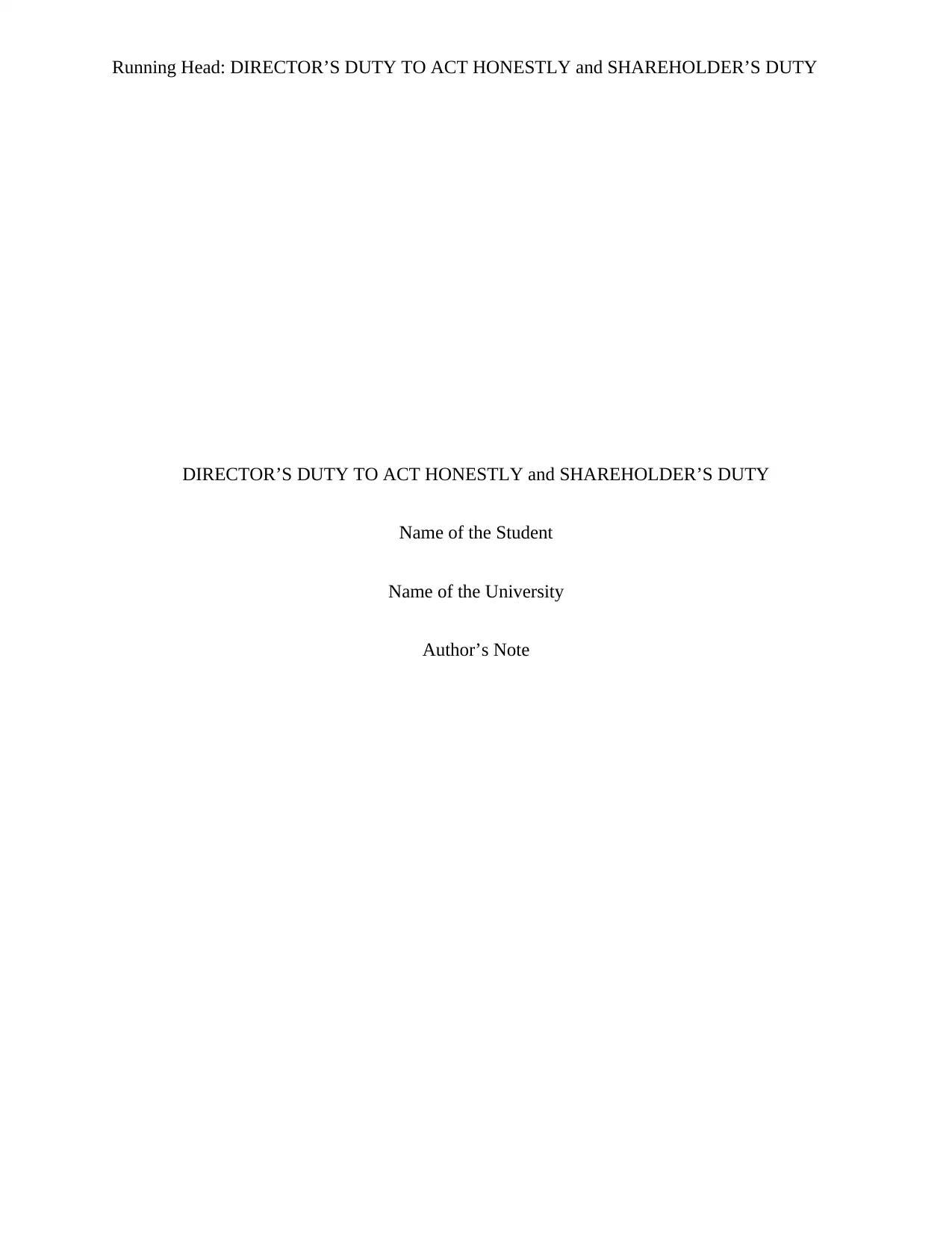
Running Head: DIRECTOR’S DUTY TO ACT HONESTLY and SHAREHOLDER’S DUTY
DIRECTOR’S DUTY TO ACT HONESTLY and SHAREHOLDER’S DUTY
Name of the Student
Name of the University
Author’s Note
DIRECTOR’S DUTY TO ACT HONESTLY and SHAREHOLDER’S DUTY
Name of the Student
Name of the University
Author’s Note
Paraphrase This Document
Need a fresh take? Get an instant paraphrase of this document with our AI Paraphraser
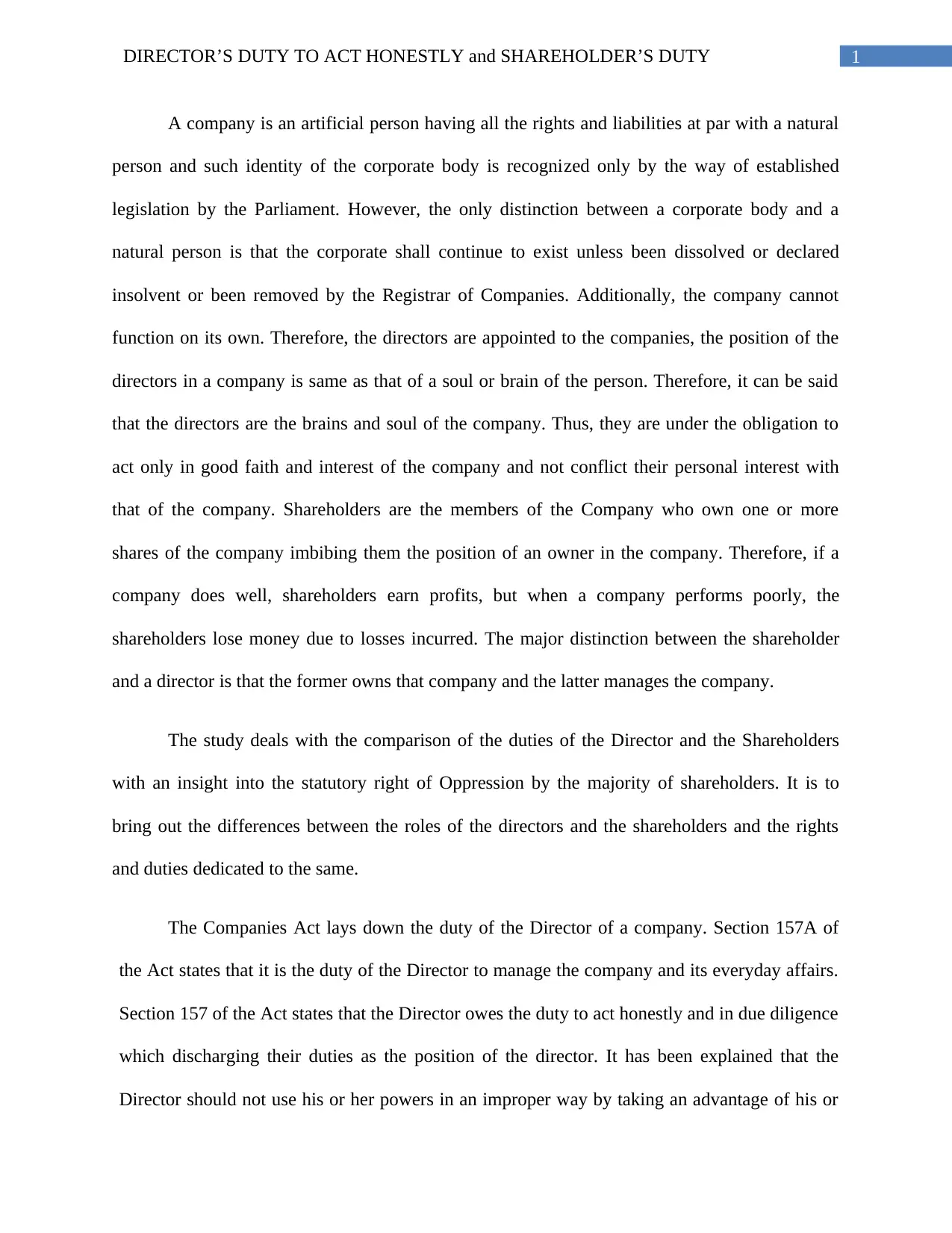
1DIRECTOR’S DUTY TO ACT HONESTLY and SHAREHOLDER’S DUTY
A company is an artificial person having all the rights and liabilities at par with a natural
person and such identity of the corporate body is recognized only by the way of established
legislation by the Parliament. However, the only distinction between a corporate body and a
natural person is that the corporate shall continue to exist unless been dissolved or declared
insolvent or been removed by the Registrar of Companies. Additionally, the company cannot
function on its own. Therefore, the directors are appointed to the companies, the position of the
directors in a company is same as that of a soul or brain of the person. Therefore, it can be said
that the directors are the brains and soul of the company. Thus, they are under the obligation to
act only in good faith and interest of the company and not conflict their personal interest with
that of the company. Shareholders are the members of the Company who own one or more
shares of the company imbibing them the position of an owner in the company. Therefore, if a
company does well, shareholders earn profits, but when a company performs poorly, the
shareholders lose money due to losses incurred. The major distinction between the shareholder
and a director is that the former owns that company and the latter manages the company.
The study deals with the comparison of the duties of the Director and the Shareholders
with an insight into the statutory right of Oppression by the majority of shareholders. It is to
bring out the differences between the roles of the directors and the shareholders and the rights
and duties dedicated to the same.
The Companies Act lays down the duty of the Director of a company. Section 157A of
the Act states that it is the duty of the Director to manage the company and its everyday affairs.
Section 157 of the Act states that the Director owes the duty to act honestly and in due diligence
which discharging their duties as the position of the director. It has been explained that the
Director should not use his or her powers in an improper way by taking an advantage of his or
A company is an artificial person having all the rights and liabilities at par with a natural
person and such identity of the corporate body is recognized only by the way of established
legislation by the Parliament. However, the only distinction between a corporate body and a
natural person is that the corporate shall continue to exist unless been dissolved or declared
insolvent or been removed by the Registrar of Companies. Additionally, the company cannot
function on its own. Therefore, the directors are appointed to the companies, the position of the
directors in a company is same as that of a soul or brain of the person. Therefore, it can be said
that the directors are the brains and soul of the company. Thus, they are under the obligation to
act only in good faith and interest of the company and not conflict their personal interest with
that of the company. Shareholders are the members of the Company who own one or more
shares of the company imbibing them the position of an owner in the company. Therefore, if a
company does well, shareholders earn profits, but when a company performs poorly, the
shareholders lose money due to losses incurred. The major distinction between the shareholder
and a director is that the former owns that company and the latter manages the company.
The study deals with the comparison of the duties of the Director and the Shareholders
with an insight into the statutory right of Oppression by the majority of shareholders. It is to
bring out the differences between the roles of the directors and the shareholders and the rights
and duties dedicated to the same.
The Companies Act lays down the duty of the Director of a company. Section 157A of
the Act states that it is the duty of the Director to manage the company and its everyday affairs.
Section 157 of the Act states that the Director owes the duty to act honestly and in due diligence
which discharging their duties as the position of the director. It has been explained that the
Director should not use his or her powers in an improper way by taking an advantage of his or
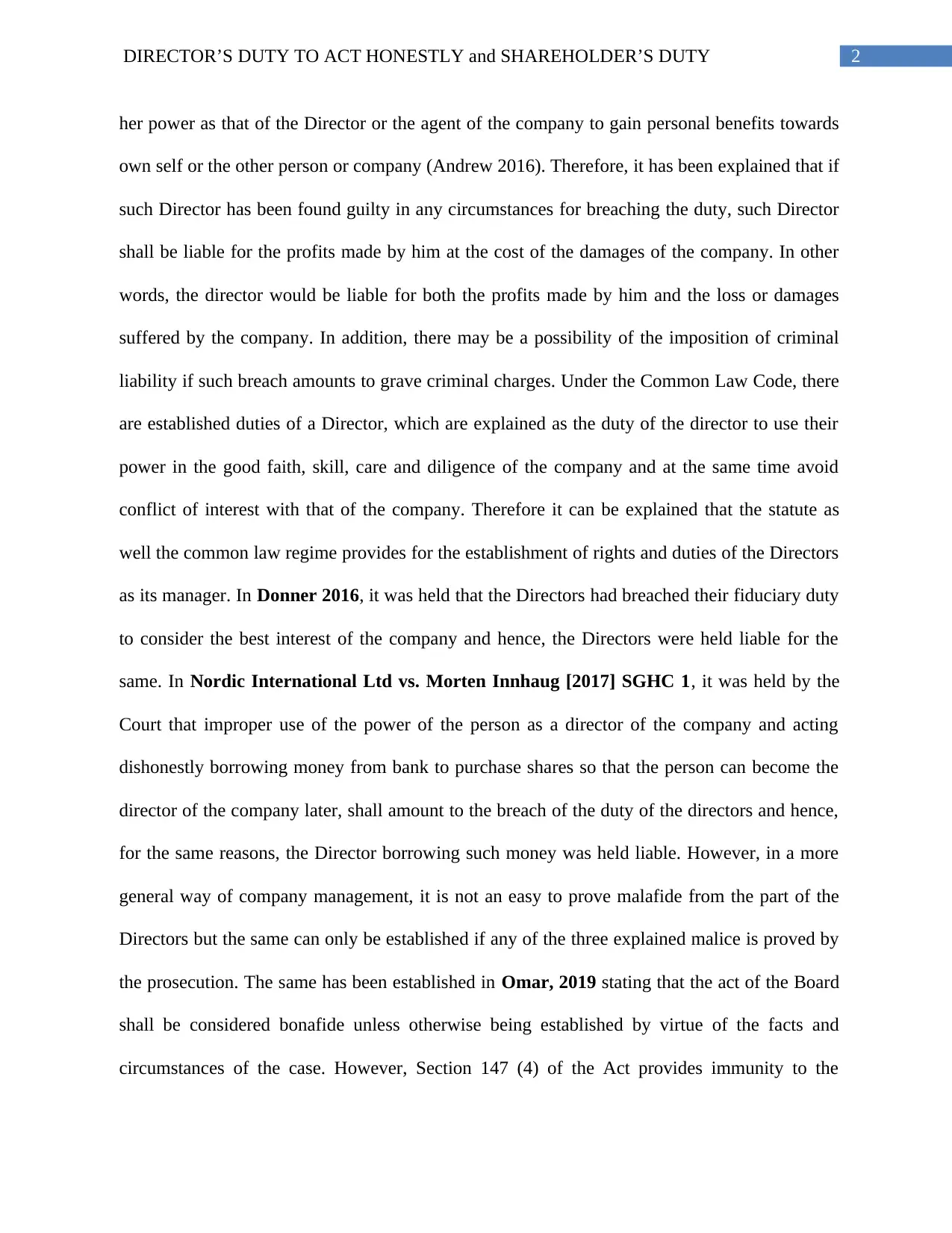
2DIRECTOR’S DUTY TO ACT HONESTLY and SHAREHOLDER’S DUTY
her power as that of the Director or the agent of the company to gain personal benefits towards
own self or the other person or company (Andrew 2016). Therefore, it has been explained that if
such Director has been found guilty in any circumstances for breaching the duty, such Director
shall be liable for the profits made by him at the cost of the damages of the company. In other
words, the director would be liable for both the profits made by him and the loss or damages
suffered by the company. In addition, there may be a possibility of the imposition of criminal
liability if such breach amounts to grave criminal charges. Under the Common Law Code, there
are established duties of a Director, which are explained as the duty of the director to use their
power in the good faith, skill, care and diligence of the company and at the same time avoid
conflict of interest with that of the company. Therefore it can be explained that the statute as
well the common law regime provides for the establishment of rights and duties of the Directors
as its manager. In Donner 2016, it was held that the Directors had breached their fiduciary duty
to consider the best interest of the company and hence, the Directors were held liable for the
same. In Nordic International Ltd vs. Morten Innhaug [2017] SGHC 1, it was held by the
Court that improper use of the power of the person as a director of the company and acting
dishonestly borrowing money from bank to purchase shares so that the person can become the
director of the company later, shall amount to the breach of the duty of the directors and hence,
for the same reasons, the Director borrowing such money was held liable. However, in a more
general way of company management, it is not an easy to prove malafide from the part of the
Directors but the same can only be established if any of the three explained malice is proved by
the prosecution. The same has been established in Omar, 2019 stating that the act of the Board
shall be considered bonafide unless otherwise being established by virtue of the facts and
circumstances of the case. However, Section 147 (4) of the Act provides immunity to the
her power as that of the Director or the agent of the company to gain personal benefits towards
own self or the other person or company (Andrew 2016). Therefore, it has been explained that if
such Director has been found guilty in any circumstances for breaching the duty, such Director
shall be liable for the profits made by him at the cost of the damages of the company. In other
words, the director would be liable for both the profits made by him and the loss or damages
suffered by the company. In addition, there may be a possibility of the imposition of criminal
liability if such breach amounts to grave criminal charges. Under the Common Law Code, there
are established duties of a Director, which are explained as the duty of the director to use their
power in the good faith, skill, care and diligence of the company and at the same time avoid
conflict of interest with that of the company. Therefore it can be explained that the statute as
well the common law regime provides for the establishment of rights and duties of the Directors
as its manager. In Donner 2016, it was held that the Directors had breached their fiduciary duty
to consider the best interest of the company and hence, the Directors were held liable for the
same. In Nordic International Ltd vs. Morten Innhaug [2017] SGHC 1, it was held by the
Court that improper use of the power of the person as a director of the company and acting
dishonestly borrowing money from bank to purchase shares so that the person can become the
director of the company later, shall amount to the breach of the duty of the directors and hence,
for the same reasons, the Director borrowing such money was held liable. However, in a more
general way of company management, it is not an easy to prove malafide from the part of the
Directors but the same can only be established if any of the three explained malice is proved by
the prosecution. The same has been established in Omar, 2019 stating that the act of the Board
shall be considered bonafide unless otherwise being established by virtue of the facts and
circumstances of the case. However, Section 147 (4) of the Act provides immunity to the
⊘ This is a preview!⊘
Do you want full access?
Subscribe today to unlock all pages.

Trusted by 1+ million students worldwide
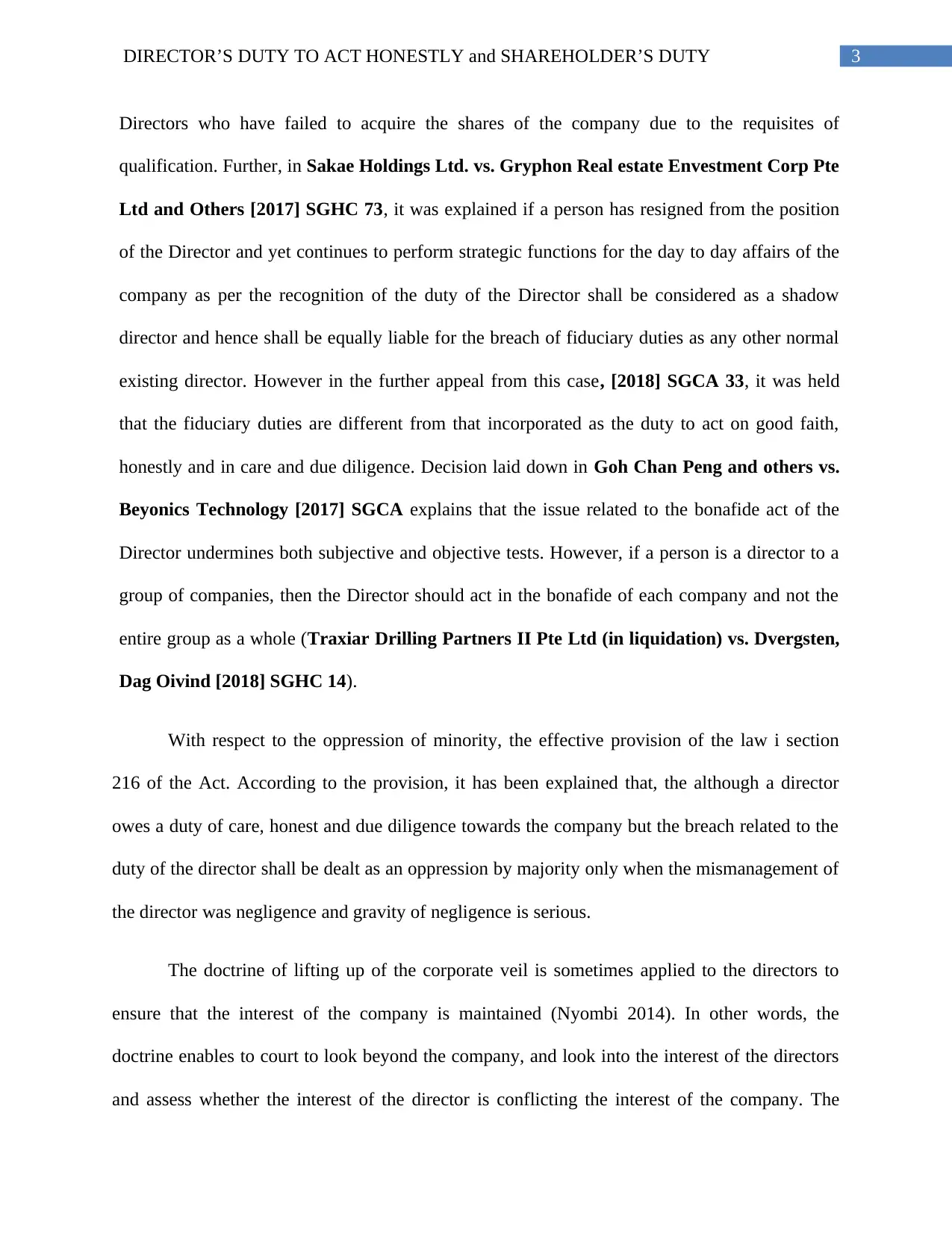
3DIRECTOR’S DUTY TO ACT HONESTLY and SHAREHOLDER’S DUTY
Directors who have failed to acquire the shares of the company due to the requisites of
qualification. Further, in Sakae Holdings Ltd. vs. Gryphon Real estate Envestment Corp Pte
Ltd and Others [2017] SGHC 73, it was explained if a person has resigned from the position
of the Director and yet continues to perform strategic functions for the day to day affairs of the
company as per the recognition of the duty of the Director shall be considered as a shadow
director and hence shall be equally liable for the breach of fiduciary duties as any other normal
existing director. However in the further appeal from this case, [2018] SGCA 33, it was held
that the fiduciary duties are different from that incorporated as the duty to act on good faith,
honestly and in care and due diligence. Decision laid down in Goh Chan Peng and others vs.
Beyonics Technology [2017] SGCA explains that the issue related to the bonafide act of the
Director undermines both subjective and objective tests. However, if a person is a director to a
group of companies, then the Director should act in the bonafide of each company and not the
entire group as a whole (Traxiar Drilling Partners II Pte Ltd (in liquidation) vs. Dvergsten,
Dag Oivind [2018] SGHC 14).
With respect to the oppression of minority, the effective provision of the law i section
216 of the Act. According to the provision, it has been explained that, the although a director
owes a duty of care, honest and due diligence towards the company but the breach related to the
duty of the director shall be dealt as an oppression by majority only when the mismanagement of
the director was negligence and gravity of negligence is serious.
The doctrine of lifting up of the corporate veil is sometimes applied to the directors to
ensure that the interest of the company is maintained (Nyombi 2014). In other words, the
doctrine enables to court to look beyond the company, and look into the interest of the directors
and assess whether the interest of the director is conflicting the interest of the company. The
Directors who have failed to acquire the shares of the company due to the requisites of
qualification. Further, in Sakae Holdings Ltd. vs. Gryphon Real estate Envestment Corp Pte
Ltd and Others [2017] SGHC 73, it was explained if a person has resigned from the position
of the Director and yet continues to perform strategic functions for the day to day affairs of the
company as per the recognition of the duty of the Director shall be considered as a shadow
director and hence shall be equally liable for the breach of fiduciary duties as any other normal
existing director. However in the further appeal from this case, [2018] SGCA 33, it was held
that the fiduciary duties are different from that incorporated as the duty to act on good faith,
honestly and in care and due diligence. Decision laid down in Goh Chan Peng and others vs.
Beyonics Technology [2017] SGCA explains that the issue related to the bonafide act of the
Director undermines both subjective and objective tests. However, if a person is a director to a
group of companies, then the Director should act in the bonafide of each company and not the
entire group as a whole (Traxiar Drilling Partners II Pte Ltd (in liquidation) vs. Dvergsten,
Dag Oivind [2018] SGHC 14).
With respect to the oppression of minority, the effective provision of the law i section
216 of the Act. According to the provision, it has been explained that, the although a director
owes a duty of care, honest and due diligence towards the company but the breach related to the
duty of the director shall be dealt as an oppression by majority only when the mismanagement of
the director was negligence and gravity of negligence is serious.
The doctrine of lifting up of the corporate veil is sometimes applied to the directors to
ensure that the interest of the company is maintained (Nyombi 2014). In other words, the
doctrine enables to court to look beyond the company, and look into the interest of the directors
and assess whether the interest of the director is conflicting the interest of the company. The
Paraphrase This Document
Need a fresh take? Get an instant paraphrase of this document with our AI Paraphraser
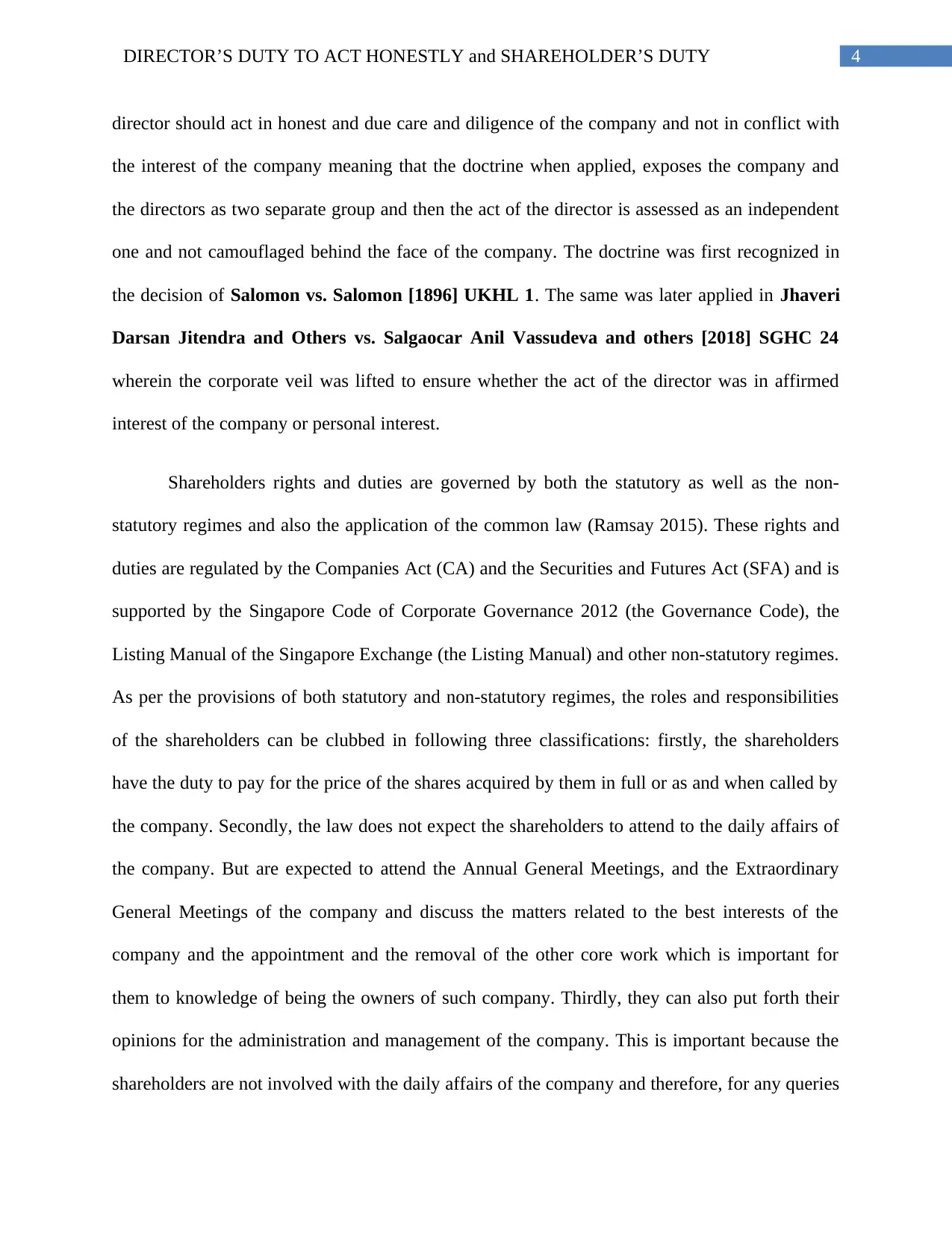
4DIRECTOR’S DUTY TO ACT HONESTLY and SHAREHOLDER’S DUTY
director should act in honest and due care and diligence of the company and not in conflict with
the interest of the company meaning that the doctrine when applied, exposes the company and
the directors as two separate group and then the act of the director is assessed as an independent
one and not camouflaged behind the face of the company. The doctrine was first recognized in
the decision of Salomon vs. Salomon [1896] UKHL 1. The same was later applied in Jhaveri
Darsan Jitendra and Others vs. Salgaocar Anil Vassudeva and others [2018] SGHC 24
wherein the corporate veil was lifted to ensure whether the act of the director was in affirmed
interest of the company or personal interest.
Shareholders rights and duties are governed by both the statutory as well as the non-
statutory regimes and also the application of the common law (Ramsay 2015). These rights and
duties are regulated by the Companies Act (CA) and the Securities and Futures Act (SFA) and is
supported by the Singapore Code of Corporate Governance 2012 (the Governance Code), the
Listing Manual of the Singapore Exchange (the Listing Manual) and other non-statutory regimes.
As per the provisions of both statutory and non-statutory regimes, the roles and responsibilities
of the shareholders can be clubbed in following three classifications: firstly, the shareholders
have the duty to pay for the price of the shares acquired by them in full or as and when called by
the company. Secondly, the law does not expect the shareholders to attend to the daily affairs of
the company. But are expected to attend the Annual General Meetings, and the Extraordinary
General Meetings of the company and discuss the matters related to the best interests of the
company and the appointment and the removal of the other core work which is important for
them to knowledge of being the owners of such company. Thirdly, they can also put forth their
opinions for the administration and management of the company. This is important because the
shareholders are not involved with the daily affairs of the company and therefore, for any queries
director should act in honest and due care and diligence of the company and not in conflict with
the interest of the company meaning that the doctrine when applied, exposes the company and
the directors as two separate group and then the act of the director is assessed as an independent
one and not camouflaged behind the face of the company. The doctrine was first recognized in
the decision of Salomon vs. Salomon [1896] UKHL 1. The same was later applied in Jhaveri
Darsan Jitendra and Others vs. Salgaocar Anil Vassudeva and others [2018] SGHC 24
wherein the corporate veil was lifted to ensure whether the act of the director was in affirmed
interest of the company or personal interest.
Shareholders rights and duties are governed by both the statutory as well as the non-
statutory regimes and also the application of the common law (Ramsay 2015). These rights and
duties are regulated by the Companies Act (CA) and the Securities and Futures Act (SFA) and is
supported by the Singapore Code of Corporate Governance 2012 (the Governance Code), the
Listing Manual of the Singapore Exchange (the Listing Manual) and other non-statutory regimes.
As per the provisions of both statutory and non-statutory regimes, the roles and responsibilities
of the shareholders can be clubbed in following three classifications: firstly, the shareholders
have the duty to pay for the price of the shares acquired by them in full or as and when called by
the company. Secondly, the law does not expect the shareholders to attend to the daily affairs of
the company. But are expected to attend the Annual General Meetings, and the Extraordinary
General Meetings of the company and discuss the matters related to the best interests of the
company and the appointment and the removal of the other core work which is important for
them to knowledge of being the owners of such company. Thirdly, they can also put forth their
opinions for the administration and management of the company. This is important because the
shareholders are not involved with the daily affairs of the company and therefore, for any queries
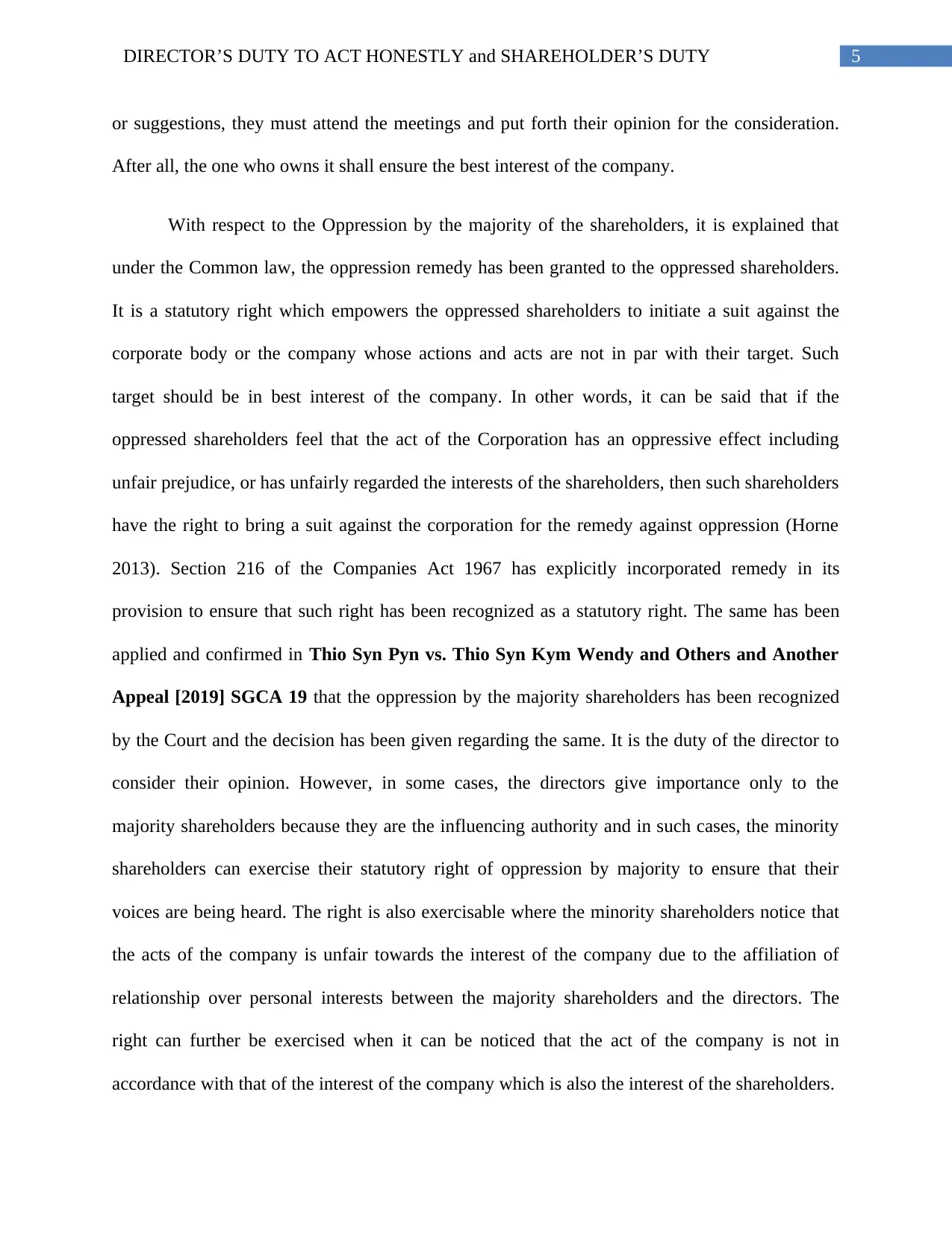
5DIRECTOR’S DUTY TO ACT HONESTLY and SHAREHOLDER’S DUTY
or suggestions, they must attend the meetings and put forth their opinion for the consideration.
After all, the one who owns it shall ensure the best interest of the company.
With respect to the Oppression by the majority of the shareholders, it is explained that
under the Common law, the oppression remedy has been granted to the oppressed shareholders.
It is a statutory right which empowers the oppressed shareholders to initiate a suit against the
corporate body or the company whose actions and acts are not in par with their target. Such
target should be in best interest of the company. In other words, it can be said that if the
oppressed shareholders feel that the act of the Corporation has an oppressive effect including
unfair prejudice, or has unfairly regarded the interests of the shareholders, then such shareholders
have the right to bring a suit against the corporation for the remedy against oppression (Horne
2013). Section 216 of the Companies Act 1967 has explicitly incorporated remedy in its
provision to ensure that such right has been recognized as a statutory right. The same has been
applied and confirmed in Thio Syn Pyn vs. Thio Syn Kym Wendy and Others and Another
Appeal [2019] SGCA 19 that the oppression by the majority shareholders has been recognized
by the Court and the decision has been given regarding the same. It is the duty of the director to
consider their opinion. However, in some cases, the directors give importance only to the
majority shareholders because they are the influencing authority and in such cases, the minority
shareholders can exercise their statutory right of oppression by majority to ensure that their
voices are being heard. The right is also exercisable where the minority shareholders notice that
the acts of the company is unfair towards the interest of the company due to the affiliation of
relationship over personal interests between the majority shareholders and the directors. The
right can further be exercised when it can be noticed that the act of the company is not in
accordance with that of the interest of the company which is also the interest of the shareholders.
or suggestions, they must attend the meetings and put forth their opinion for the consideration.
After all, the one who owns it shall ensure the best interest of the company.
With respect to the Oppression by the majority of the shareholders, it is explained that
under the Common law, the oppression remedy has been granted to the oppressed shareholders.
It is a statutory right which empowers the oppressed shareholders to initiate a suit against the
corporate body or the company whose actions and acts are not in par with their target. Such
target should be in best interest of the company. In other words, it can be said that if the
oppressed shareholders feel that the act of the Corporation has an oppressive effect including
unfair prejudice, or has unfairly regarded the interests of the shareholders, then such shareholders
have the right to bring a suit against the corporation for the remedy against oppression (Horne
2013). Section 216 of the Companies Act 1967 has explicitly incorporated remedy in its
provision to ensure that such right has been recognized as a statutory right. The same has been
applied and confirmed in Thio Syn Pyn vs. Thio Syn Kym Wendy and Others and Another
Appeal [2019] SGCA 19 that the oppression by the majority shareholders has been recognized
by the Court and the decision has been given regarding the same. It is the duty of the director to
consider their opinion. However, in some cases, the directors give importance only to the
majority shareholders because they are the influencing authority and in such cases, the minority
shareholders can exercise their statutory right of oppression by majority to ensure that their
voices are being heard. The right is also exercisable where the minority shareholders notice that
the acts of the company is unfair towards the interest of the company due to the affiliation of
relationship over personal interests between the majority shareholders and the directors. The
right can further be exercised when it can be noticed that the act of the company is not in
accordance with that of the interest of the company which is also the interest of the shareholders.
⊘ This is a preview!⊘
Do you want full access?
Subscribe today to unlock all pages.

Trusted by 1+ million students worldwide
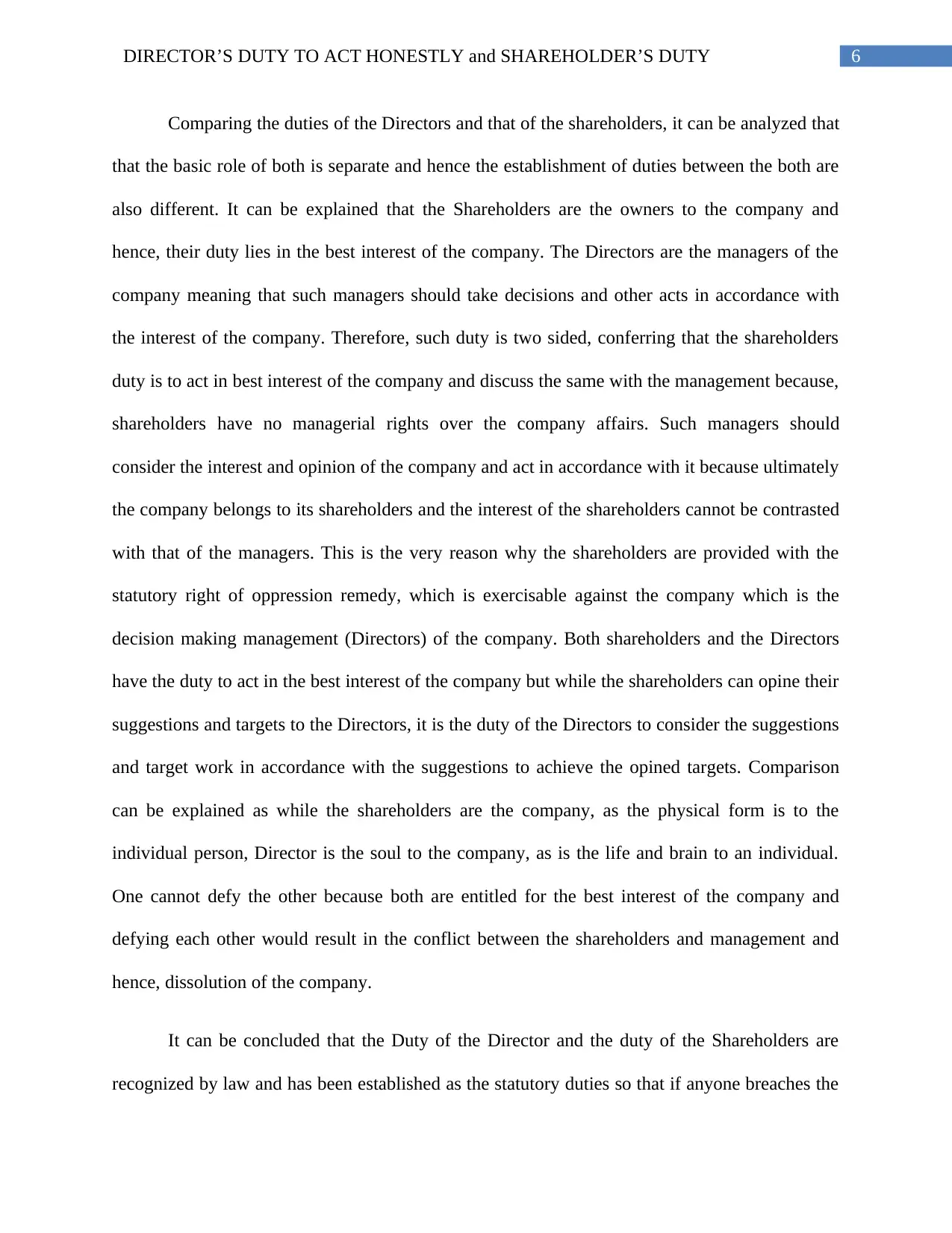
6DIRECTOR’S DUTY TO ACT HONESTLY and SHAREHOLDER’S DUTY
Comparing the duties of the Directors and that of the shareholders, it can be analyzed that
that the basic role of both is separate and hence the establishment of duties between the both are
also different. It can be explained that the Shareholders are the owners to the company and
hence, their duty lies in the best interest of the company. The Directors are the managers of the
company meaning that such managers should take decisions and other acts in accordance with
the interest of the company. Therefore, such duty is two sided, conferring that the shareholders
duty is to act in best interest of the company and discuss the same with the management because,
shareholders have no managerial rights over the company affairs. Such managers should
consider the interest and opinion of the company and act in accordance with it because ultimately
the company belongs to its shareholders and the interest of the shareholders cannot be contrasted
with that of the managers. This is the very reason why the shareholders are provided with the
statutory right of oppression remedy, which is exercisable against the company which is the
decision making management (Directors) of the company. Both shareholders and the Directors
have the duty to act in the best interest of the company but while the shareholders can opine their
suggestions and targets to the Directors, it is the duty of the Directors to consider the suggestions
and target work in accordance with the suggestions to achieve the opined targets. Comparison
can be explained as while the shareholders are the company, as the physical form is to the
individual person, Director is the soul to the company, as is the life and brain to an individual.
One cannot defy the other because both are entitled for the best interest of the company and
defying each other would result in the conflict between the shareholders and management and
hence, dissolution of the company.
It can be concluded that the Duty of the Director and the duty of the Shareholders are
recognized by law and has been established as the statutory duties so that if anyone breaches the
Comparing the duties of the Directors and that of the shareholders, it can be analyzed that
that the basic role of both is separate and hence the establishment of duties between the both are
also different. It can be explained that the Shareholders are the owners to the company and
hence, their duty lies in the best interest of the company. The Directors are the managers of the
company meaning that such managers should take decisions and other acts in accordance with
the interest of the company. Therefore, such duty is two sided, conferring that the shareholders
duty is to act in best interest of the company and discuss the same with the management because,
shareholders have no managerial rights over the company affairs. Such managers should
consider the interest and opinion of the company and act in accordance with it because ultimately
the company belongs to its shareholders and the interest of the shareholders cannot be contrasted
with that of the managers. This is the very reason why the shareholders are provided with the
statutory right of oppression remedy, which is exercisable against the company which is the
decision making management (Directors) of the company. Both shareholders and the Directors
have the duty to act in the best interest of the company but while the shareholders can opine their
suggestions and targets to the Directors, it is the duty of the Directors to consider the suggestions
and target work in accordance with the suggestions to achieve the opined targets. Comparison
can be explained as while the shareholders are the company, as the physical form is to the
individual person, Director is the soul to the company, as is the life and brain to an individual.
One cannot defy the other because both are entitled for the best interest of the company and
defying each other would result in the conflict between the shareholders and management and
hence, dissolution of the company.
It can be concluded that the Duty of the Director and the duty of the Shareholders are
recognized by law and has been established as the statutory duties so that if anyone breaches the
Paraphrase This Document
Need a fresh take? Get an instant paraphrase of this document with our AI Paraphraser
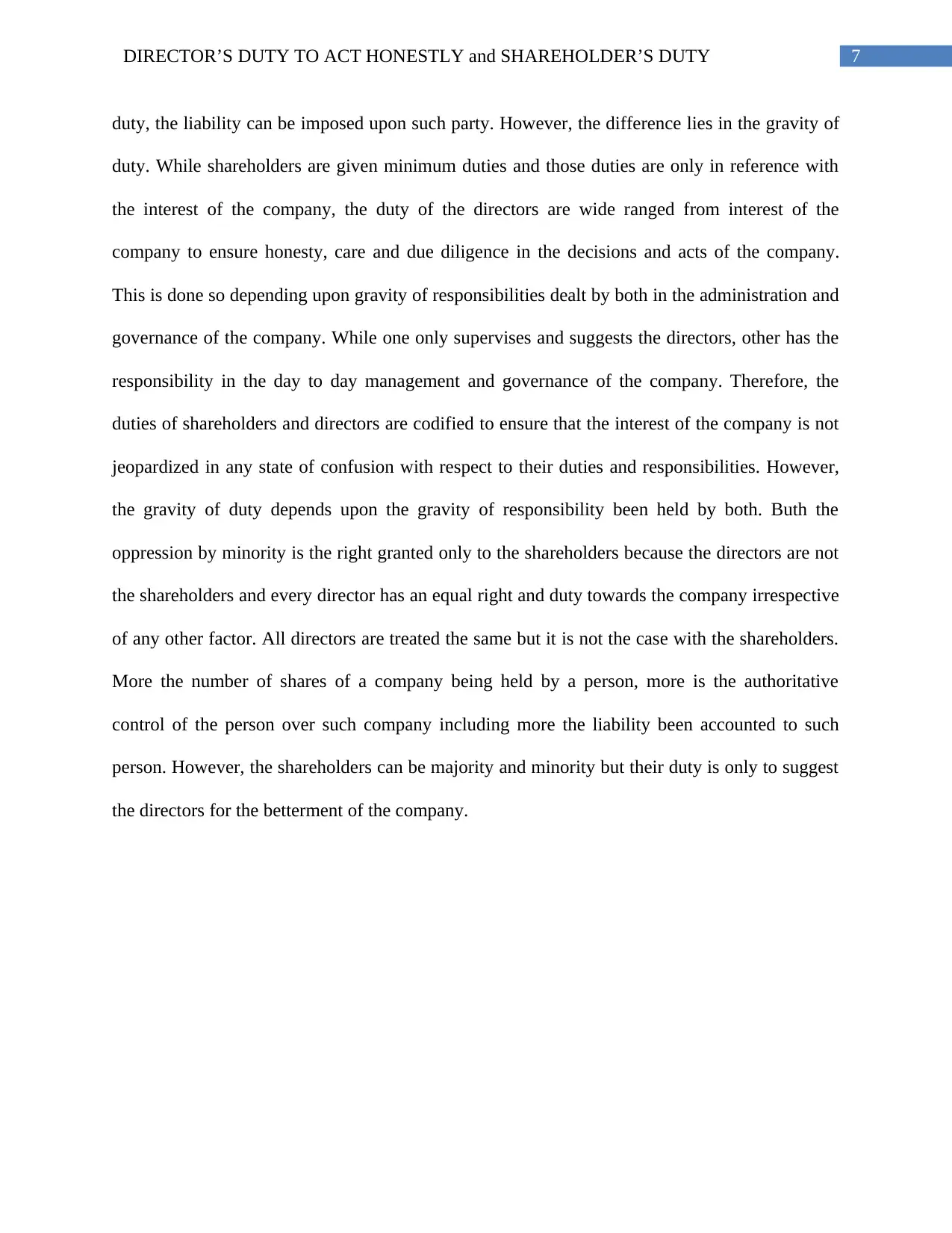
7DIRECTOR’S DUTY TO ACT HONESTLY and SHAREHOLDER’S DUTY
duty, the liability can be imposed upon such party. However, the difference lies in the gravity of
duty. While shareholders are given minimum duties and those duties are only in reference with
the interest of the company, the duty of the directors are wide ranged from interest of the
company to ensure honesty, care and due diligence in the decisions and acts of the company.
This is done so depending upon gravity of responsibilities dealt by both in the administration and
governance of the company. While one only supervises and suggests the directors, other has the
responsibility in the day to day management and governance of the company. Therefore, the
duties of shareholders and directors are codified to ensure that the interest of the company is not
jeopardized in any state of confusion with respect to their duties and responsibilities. However,
the gravity of duty depends upon the gravity of responsibility been held by both. Buth the
oppression by minority is the right granted only to the shareholders because the directors are not
the shareholders and every director has an equal right and duty towards the company irrespective
of any other factor. All directors are treated the same but it is not the case with the shareholders.
More the number of shares of a company being held by a person, more is the authoritative
control of the person over such company including more the liability been accounted to such
person. However, the shareholders can be majority and minority but their duty is only to suggest
the directors for the betterment of the company.
duty, the liability can be imposed upon such party. However, the difference lies in the gravity of
duty. While shareholders are given minimum duties and those duties are only in reference with
the interest of the company, the duty of the directors are wide ranged from interest of the
company to ensure honesty, care and due diligence in the decisions and acts of the company.
This is done so depending upon gravity of responsibilities dealt by both in the administration and
governance of the company. While one only supervises and suggests the directors, other has the
responsibility in the day to day management and governance of the company. Therefore, the
duties of shareholders and directors are codified to ensure that the interest of the company is not
jeopardized in any state of confusion with respect to their duties and responsibilities. However,
the gravity of duty depends upon the gravity of responsibility been held by both. Buth the
oppression by minority is the right granted only to the shareholders because the directors are not
the shareholders and every director has an equal right and duty towards the company irrespective
of any other factor. All directors are treated the same but it is not the case with the shareholders.
More the number of shares of a company being held by a person, more is the authoritative
control of the person over such company including more the liability been accounted to such
person. However, the shareholders can be majority and minority but their duty is only to suggest
the directors for the betterment of the company.
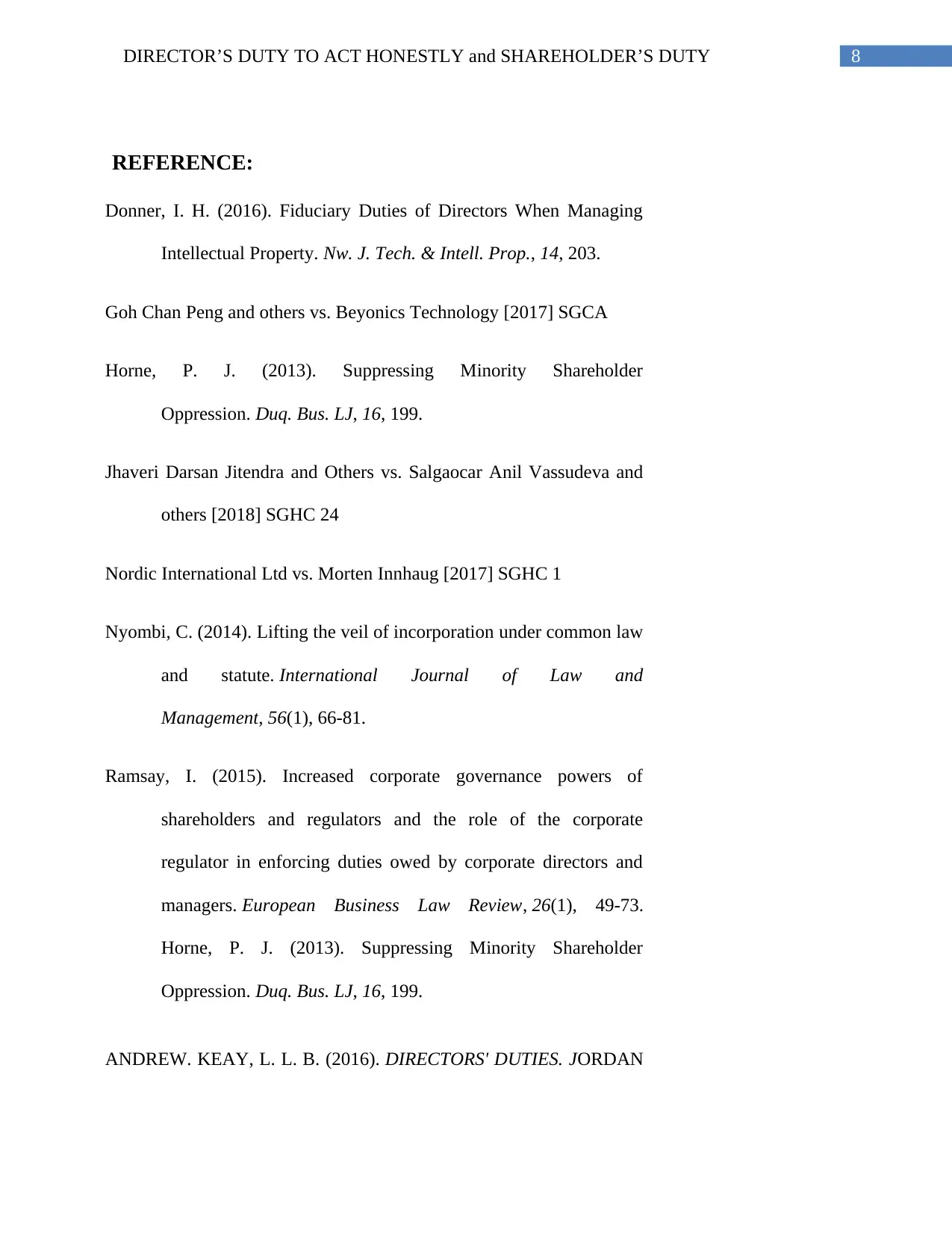
8DIRECTOR’S DUTY TO ACT HONESTLY and SHAREHOLDER’S DUTY
REFERENCE:
Donner, I. H. (2016). Fiduciary Duties of Directors When Managing
Intellectual Property. Nw. J. Tech. & Intell. Prop., 14, 203.
Goh Chan Peng and others vs. Beyonics Technology [2017] SGCA
Horne, P. J. (2013). Suppressing Minority Shareholder
Oppression. Duq. Bus. LJ, 16, 199.
Jhaveri Darsan Jitendra and Others vs. Salgaocar Anil Vassudeva and
others [2018] SGHC 24
Nordic International Ltd vs. Morten Innhaug [2017] SGHC 1
Nyombi, C. (2014). Lifting the veil of incorporation under common law
and statute. International Journal of Law and
Management, 56(1), 66-81.
Ramsay, I. (2015). Increased corporate governance powers of
shareholders and regulators and the role of the corporate
regulator in enforcing duties owed by corporate directors and
managers. European Business Law Review, 26(1), 49-73.
Horne, P. J. (2013). Suppressing Minority Shareholder
Oppression. Duq. Bus. LJ, 16, 199.
ANDREW. KEAY, L. L. B. (2016). DIRECTORS' DUTIES. JORDAN
REFERENCE:
Donner, I. H. (2016). Fiduciary Duties of Directors When Managing
Intellectual Property. Nw. J. Tech. & Intell. Prop., 14, 203.
Goh Chan Peng and others vs. Beyonics Technology [2017] SGCA
Horne, P. J. (2013). Suppressing Minority Shareholder
Oppression. Duq. Bus. LJ, 16, 199.
Jhaveri Darsan Jitendra and Others vs. Salgaocar Anil Vassudeva and
others [2018] SGHC 24
Nordic International Ltd vs. Morten Innhaug [2017] SGHC 1
Nyombi, C. (2014). Lifting the veil of incorporation under common law
and statute. International Journal of Law and
Management, 56(1), 66-81.
Ramsay, I. (2015). Increased corporate governance powers of
shareholders and regulators and the role of the corporate
regulator in enforcing duties owed by corporate directors and
managers. European Business Law Review, 26(1), 49-73.
Horne, P. J. (2013). Suppressing Minority Shareholder
Oppression. Duq. Bus. LJ, 16, 199.
ANDREW. KEAY, L. L. B. (2016). DIRECTORS' DUTIES. JORDAN
⊘ This is a preview!⊘
Do you want full access?
Subscribe today to unlock all pages.

Trusted by 1+ million students worldwide
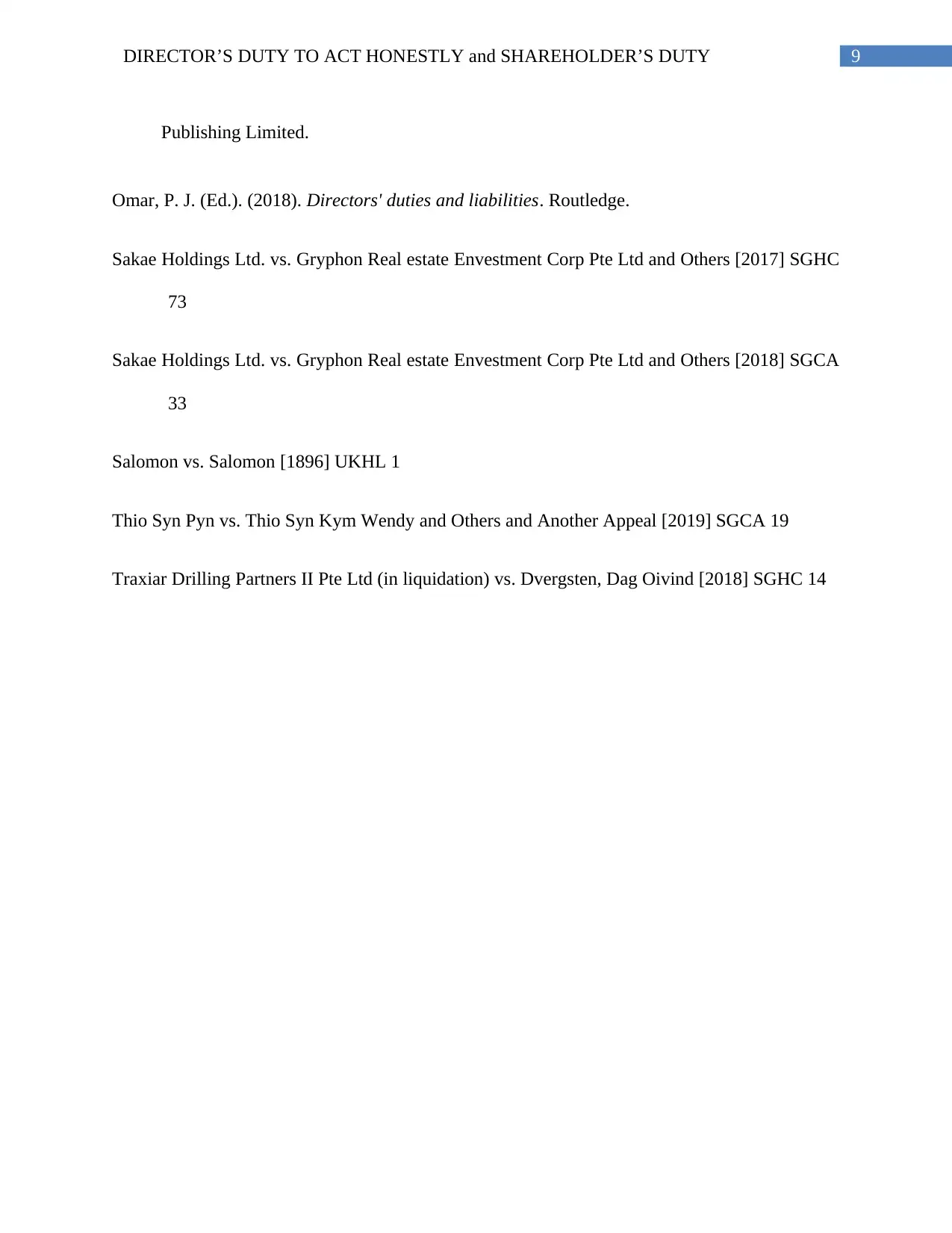
9DIRECTOR’S DUTY TO ACT HONESTLY and SHAREHOLDER’S DUTY
Publishing Limited.
Omar, P. J. (Ed.). (2018). Directors' duties and liabilities. Routledge.
Sakae Holdings Ltd. vs. Gryphon Real estate Envestment Corp Pte Ltd and Others [2017] SGHC
73
Sakae Holdings Ltd. vs. Gryphon Real estate Envestment Corp Pte Ltd and Others [2018] SGCA
33
Salomon vs. Salomon [1896] UKHL 1
Thio Syn Pyn vs. Thio Syn Kym Wendy and Others and Another Appeal [2019] SGCA 19
Traxiar Drilling Partners II Pte Ltd (in liquidation) vs. Dvergsten, Dag Oivind [2018] SGHC 14
Publishing Limited.
Omar, P. J. (Ed.). (2018). Directors' duties and liabilities. Routledge.
Sakae Holdings Ltd. vs. Gryphon Real estate Envestment Corp Pte Ltd and Others [2017] SGHC
73
Sakae Holdings Ltd. vs. Gryphon Real estate Envestment Corp Pte Ltd and Others [2018] SGCA
33
Salomon vs. Salomon [1896] UKHL 1
Thio Syn Pyn vs. Thio Syn Kym Wendy and Others and Another Appeal [2019] SGCA 19
Traxiar Drilling Partners II Pte Ltd (in liquidation) vs. Dvergsten, Dag Oivind [2018] SGHC 14
1 out of 10
Related Documents
Your All-in-One AI-Powered Toolkit for Academic Success.
+13062052269
info@desklib.com
Available 24*7 on WhatsApp / Email
![[object Object]](/_next/static/media/star-bottom.7253800d.svg)
Unlock your academic potential
Copyright © 2020–2026 A2Z Services. All Rights Reserved. Developed and managed by ZUCOL.





